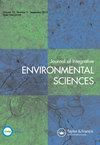The making of a sustainable food city in Barcelona: insights from the water, energy, and food urban nexus
IF 3.5
4区 环境科学与生态学
Q3 ENVIRONMENTAL SCIENCES
Journal of Integrative Environmental Sciences
Pub Date : 2020-12-22
DOI:10.1080/1943815x.2019.1675715
引用次数: 8
Abstract
ABSTRACT This paper examines the making of urban sustainable food provisioning through the case of Barcelona. Barcelona is seeking to develop a more sustainable food system. It aims to green its municipal food markets by reducing the distances from which the food is sourced from. This has been labelled by the city of Barcelona as “proximity food”. We shed light on how, and to what extent, proximity food contributes to making the city more sustainable. To frame our analysis, we employ concepts from networks and flows as developed in sociology by Manuel Castells. We examine the provisioning processes that proximity food goes through before they enter retail markets. This includes an analysis of connections with urban energy and water flows. This so-called water, energy and food Urban Nexus, which we argue to be a key factor in the greening of urban food systems. This means that sustainability of food is not just determined by physical distances between its provisioning processes per se but by the specific ways in which food flows relate to connections (both physical and social) with energy and water.巴塞罗那可持续食物之城的建立:从水、能源和食物城市关系的见解
本文通过巴塞罗那的案例考察了城市可持续食品供应的制定。巴塞罗那正在寻求发展一个更可持续的食物系统。它的目标是通过减少食物来源的距离来绿化城市食品市场。这被巴塞罗那市称为“近距离食物”。我们揭示了邻近食物如何以及在多大程度上有助于使城市更具可持续性。为了构建我们的分析框架,我们采用了Manuel Castells在社会学中提出的网络和流动的概念。我们考察了临近食品进入零售市场之前的供应过程。这包括与城市能源和水流的联系分析。这就是所谓的水,能源和食物的城市联系,我们认为这是城市食物系统绿化的关键因素。这意味着食物的可持续性不仅取决于其供应过程本身之间的物理距离,还取决于食物流动与能源和水(物理和社会)联系的具体方式。
本文章由计算机程序翻译,如有差异,请以英文原文为准。
求助全文
约1分钟内获得全文
求助全文
来源期刊

Journal of Integrative Environmental Sciences
ENVIRONMENTAL SCIENCES-
CiteScore
3.90
自引率
0.00%
发文量
13
审稿时长
>12 weeks
期刊介绍:
Journal of Integrative Environmental Sciences (JIES) provides a stimulating, informative and critical forum for intellectual debate on significant environmental issues. It brings together perspectives from a wide range of disciplines and methodologies in both the social and natural sciences in an effort to develop integrative knowledge about the processes responsible for environmental change. The Journal is especially concerned with the relationships between science, society and policy and one of its key aims is to advance understanding of the theory and practice of sustainable development.
 求助内容:
求助内容: 应助结果提醒方式:
应助结果提醒方式:


